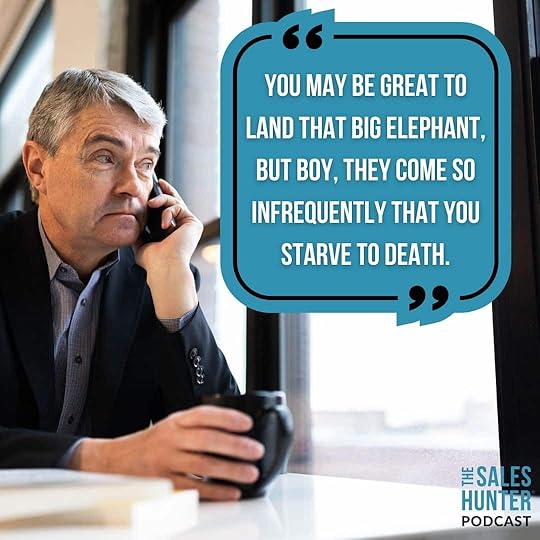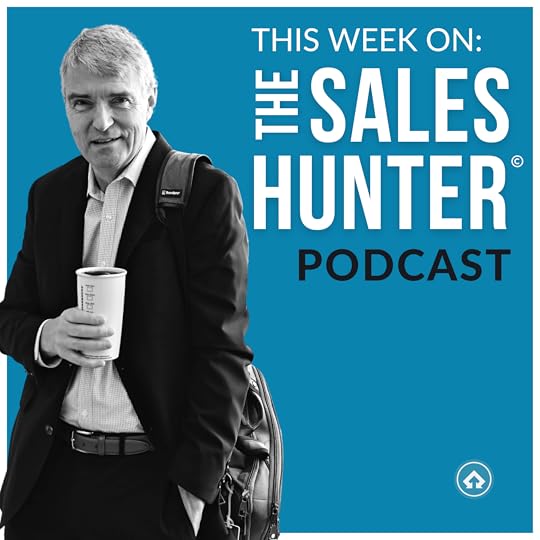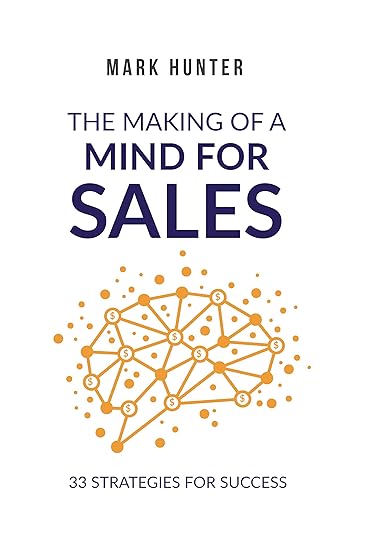Mark Hunter's Blog, page 8
July 17, 2024
Why Customers Don’t Want to Buy
What they’re willing to do is spend money to have problems solved.
They have a challenge, a pain, or they have a gain, and they’re looking for solutions. The more I can do to uncover that, the more successful I’m going to be as a salesperson when it comes to price.
1. Customers want ROI.They want to know that they’ll be able to spend money and get something back in return. If they spend money on this, it’s going to help them achieve something significant, which will provide them with a greater return.
ROI can be in a number of different ways. It may just be satisfaction, time savings, a reduction here, or this helping over here.
We have to do everything possible to help the customer understand the problem that they have, and create a value proposition that’s going to deliver the ROI that they’re looking for.
2. They won’t buy, but they will invest.
When I’m presenting a proposal to a customer, I like to frame it up in my mind that I’m not looking for them to buy. I’m looking for them to invest. I’m thinking in my head, is this a good investment for them where they’re at right now?

via Holler Studios on GIPHY3. Customers want value.
They want value. They don’t want to waste money.
If I can go through and answer each one of these questions, each one of these things I put out for you here today, you’re going to be more successful as a salesperson
Check out Mark’s new book!
Some of today’s blog content I’ve lifted from my new book, The Making of a Mind for Sales.
I’ve included 33 strategies for your sales success. Do one a day, and you’ll see big changes.
What would a journal created for driven salespeople look like?Well, it’d look a lot like this!Check out this free preview –>
$0.99 Kindle deal ends this Sunday!
 What can you learn about sales pipeline from ‘Tommy Boy?
What can you learn about sales pipeline from ‘Tommy Boy?
Explore the significance of having multiple deals in your pipeline and the art of asking with finesse.

via GIPHY Focus on the Buyerw/ Carole Mahoney
Learn the importance of asking the right questions to help buyers feel comfortable and confident in their decisions.
Ep. 222 drops Wednesday, 7/17/2024!

Copyright 2024, Mark Hunter “The Sales Hunter” Sales Motivation Blog. Mark Hunter is the author of A Mind for Sales and High-Profit Prospecting: Powerful Strategies to Find the Best Leads and Drive Breakthrough Sales Results .
The post Why Customers Don’t Want to Buy first appeared on The Sales Hunter.
July 10, 2024
5 Ways Sales Is More than a Career
While you’re elevating customers, you’re also elevating yourself.
Why are you in sales? I love sales because I don’t view sales as a job or even a profession. I view it as a lifestyle.
It’s one of the reasons I wrote the book, The Making of a Mind for Sales.
If you haven’t picked it up, grab a copy of it. It’s got 33 days, and is a journal that you work your way through. It’s really unlike any sales book I’ve written—or read!—before. Each day includes tips for how to be and have the mindset of a top performer.
1. It’s not about the money.The money could be great. But I don’t want you to be focused on just the money because then you have commission breath.
Go beyond that. The money will come when you help your customers.

via GIPHY2. Sales is not about you.
It’s about your customer.
Every morning we have to wake up and ask ourselves, “What am I going to do to help my customers?”
If I can’t be focused on that, then it’s about me.
 3. It’s about the why.
3. It’s about the why. Sales is not about what we sell or how we sell. It’s why we’re doing it—to help others.
At the end of the day, I want you to ask yourself, “Who have I helped?”
Does that begin to change some things…such as your perspective? Because when you’re totally focused on the customer, it’s amazing how really it’s no longer about you, and it’s certainly not about the money.
While you’re elevating customers, you’re also elevating yourself.
4. Sales is helping others see and achieve what they didn’t think was possible.In fact, that’s the same definition I have for leadership. Both a good salesperson and a good leader are helping others see and achieve what they didn’t think was possible.
The good salesperson is actually doing that themselves each day. They’re helping themselves see and achieve, which puts them in a better position to help others. See, what does it come down to? Sales is not a job.

via Satisfied Customer on GIPHY5. Sales is not a job.
It’s not a profession. It’s a lifestyle. When you’re totally focused on the customer and on helping them, you’re going to be in a position to control your mindset, and control your results. That’s pretty powerful.
 This week on The Sales Hunter Podcast…
This week on The Sales Hunter Podcast…Navigating Investor Conversations like a Pro
w/ Oren Klaff
Episode drops on Wednesday, 7/10/2024! Find it here.
33 Days of Accountability…and Growth!Each day includes a quote, a reflection, and space to journal your thoughts and goals. Not much of a writer? Don’t worry, this is just a small pause to slowly mold your mindset into that of a top performer.There’s something magical about taking a few minutes to journal your thinking each day…we dare you to try it.
 How to Begin Any Prospecting Call
How to Begin Any Prospecting Call
Discover how to craft questions that are not just intriguing, but irresistible to your prospects.
Available NOW wherever you stream podcasts.
Copyright 2024, Mark Hunter “The Sales Hunter” Sales Motivation Blog. Mark Hunter is the author of A Mind for Sales and High-Profit Prospecting: Powerful Strategies to Find the Best Leads and Drive Breakthrough Sales Results .
The post 5 Ways Sales Is More than a Career first appeared on The Sales Hunter.
July 3, 2024
6 Reasons to Let Your Customer Be in Control of the Sales Call
Less talking, more listening is a recipe for customer engagement and trust. Once you get a prospect talking freely, you’re much more likely to glean the information you need to take them to the next step.
Not yet convinced? Here are 6 reasons to hand over the reins.
1. How else are you going to know what their need is?Unless you’re letting them have some control, they’ll never share with you. Only when people are in control will they really share with you what they’re looking for.
2. Flush out bad actors faster.There are customers who will have conversations with you, and all they’re doing is trying to gather information themselves. Or, they’re too polite to tell you that they’re not interested. I don’t have time for either one of those.
I need to be prepared to flush out the bad actors. So if I can’t get the customer talking to me—sharing genuine needs and concerns—why in the world am I going to continue?

via Rosanna Pansino on GIPHY3. Create more value.
Maybe it’s not that we create more value, but rather the customer creates more value for themselves.
When we talk to customers, they believe what we say—at least hopefully they do. However, when they themselves say something, it’s amazing how much more they believe it. The more we get them talking, the more we get them sharing, the more confident they feel, the more they truly believe that we can help them.
We create more value by allowing them to do more talking.

Click here for a free preview of Mark’s new book.
Now available in print copies and on Kindle! 4. More engaging follow-up.The sales made in the follow-up. It’s that second, third, fourth, fifth call, and when you share information on this call, I can turn around and repeat it back to you and ask you some questions on the next call. That’s more engaging, because the customer truly believes that you’re linking everything together.
This is something I do continuously in my business. I may have information that you share with me on call number one, and I’m sharing it back with you on call number six, seven, eight.
I set the stage for you to create more value—you the customer.
5. Faster, better close.By letting the customer drive, I’m not going to waste time going down paths that they’re not interested in. Yes, I’m going to guide the conversation, but I want to first understand where they’re going, and then I’m going to build on that.
I will close faster and I’ll close better. When I say better, I mean I’ll close at a higher price because the customer has more belief in the solution. Remember, customers will invest whatever amount of money as long as they feel they’re going to get a return on their investment.

via Billion Back Records on GIPHY6. More likely to gain repeat business and referrals.
When the customer feels like they’re in charge, they’re going to feel confident and comfortable. They’re not feeling unease from you, the salesperson, and those are the people who are going to without a doubt share more.
They’re going to refer you to other people, too. You’re going to get repeat business from their own organization. It’s amazing how your business is going to grow.
Read When Is the Best Time to Ask for a Referral?
New by Mark Hunter!Check out this free preview.Sales advice and an accountability partner—all in one!?!Sales mindset strategy and goal-setting journal—all in one!?!?This small book packs a punch!
via The Sales Hunter on GIPHY
Only $0.99 on Kindle for a limited time! Print copies also available.
5 Questions to Evaluate Prospects
Optimize your sales funnel to see if the juice is worth the squeeze.
Available NOW wherever you catch your podcasts.

 Don’t leave money on the table!This week’s guest: Guitze Messina from HARDI.
Don’t leave money on the table!This week’s guest: Guitze Messina from HARDI.
Learn how to transform sales through follow-up.
Catch Ep. 218 when it goes LIVE:
Copyright 2024, Mark Hunter “The Sales Hunter” Sales Motivation Blog. Mark Hunter is the author of A Mind for Sales and High-Profit Prospecting: Powerful Strategies to Find the Best Leads and Drive Breakthrough Sales Results .
The post 6 Reasons to Let Your Customer Be in Control of the Sales Call first appeared on The Sales Hunter.
June 26, 2024
Why Setting Goals and Achieving Them Is Hard
We know it’s absolutely critical, but it’s still hard to do. Let’s walk through ten things that could be getting in the way of your success right now.
Once you identify the roadblock to your success, it’s much easier to avoid it.
1. UnreasonableWe want to have goals that stretch us—no doubt about that. But what happens when we make unreasonable goals is we quickly become disenchanted.
We see this so often with sales quotas that are unreasonably high. A salesperson might get part way through the quarter, give up, and say, “Well, I’m just going to work for it the next quarter.”
2. No commitmentA goal you make without a commitment is not a goal.
The commitment needs to be that you understand what it’s going to take to achieve that goal.

via ABC Network on GIPHY3. Failure to believe
If there’s no commitment and it’s unreasonable, disbelief is almost certain.
I’ve got to believe in the goal and the strategy for how I’m going to achieve it.

via Apple TV on GIPHY4. Review and plan
When you set a goal, you create a plan, but you also have to review your plan.
Most salespeople set a goal and then they never look at it again. Then they wonder why at the end of the period they haven’t achieved their goal—because they didn’t review it!
Review your plan daily, because you’ve got to stay focused.
5. Time concernsSometimes people will set goals and they’re fine, but there just isn’t enough time to get it done. I’ve got to understand the time concerns. How is this goal going to fit in with everything else that I’ve got going on?
Never create a goal without looking at the big picture.
You may have a goal that’s a subset of something bigger, but how does that fit into the bigger picture? And is there time to be able to achieve it?
 FREE Preview of Mark’s new book below! What could you achieve in 33 days?33 Strategies in 33 Days…are you up to the challenge?
FREE Preview of Mark’s new book below! What could you achieve in 33 days?33 Strategies in 33 Days…are you up to the challenge?
I’m thrilled to bring you an opportunity to go deeper into your own sales mindset with The Making of a Mind for Sales—available on Kindle now! $0.99 for a limited time.
6. Lack of a role model
I want to have a role model of others who I can look to who have been able to accomplish similar goals successfully.
I don’t want to look at somebody who just ‘poofs’ their way through and achieves their goals. Rather, I want to look at somebody who actually had to struggle a little bit.
That tells me that if I encounter problems, it’s okay. I can make it through.
7. AccountabilityYou have to be accountable. A goal that is not shared is not a goal.
If you’re going to achieve a goal, you have to be willing to be held accountable to it. This is not just your boss. This is a peer group—other people who are going to help you stay on course via guidance and direction.
Unfortunately, most people just don’t feel comfortable with that type of relationship with their boss.
The more accountability I have, the greater the probability is that I’m going to achieve that goal.
8. Poor focusPoor focus comes into play because we allow ourselves to get distracted.
Distracted—why? Because you’re not reviewing your goal daily. Because you don’t have any accountability, or don’t understand the time concerns involved. Perhaps you lack a role model.

via SVT on GIPHY9. Small steps
We can’t expect to accomplish goals in one fell swoop.
Key goals are achieved through the small steps done daily.
You want to break your goal down into very small pieces, and as you accomplish those pieces, you celebrate the success of each piece.
10. AttitudeRead about How Salespeople Can Organize Their Time and Goals
I put this number ten very intentionally because I can have the previous nine all in place, but if my attitude’s bad, forget it.
Attitude isn’t necessarily going to drive everything else. However, attitude is going to help give me the fuel in the engine to keep going when things are tough.
 Harness Friday’s Potentialto Boost Your Sales
Harness Friday’s Potentialto Boost Your Sales
This episode busts the myth that Fridays are bad for sales.
Find Ep. 215 on The Sales Hunter Podcast now.
Join Mark Hunter and Jackie JoyLearn how to avoid the dreaded “friend zone” and instead, position yourself as a trusted advisor and partner.Episode drops WEDNESDAY, 6/26/2024!!

 Looking for sales accountability?
Looking for sales accountability?
Join THIS rising tide and find the community and accountability you need to reach your sales goals…and much more!
Kickstart your journey to the top; learn more about the Mastermind here.
 The Most Comprehensive Prospecting Training Available.
The Most Comprehensive Prospecting Training Available.54 modules at your fingertips. The learning starts now.
Watch them all, or pick and choose what you need to improve.
Click here to learn everything you need to know about turning prospects into profits.

via The Sales Hunter on GIPHY
Copyright 2024, Mark Hunter “The Sales Hunter” Sales Motivation Blog. Mark Hunter is the author of A Mind for Sales and High-Profit Prospecting: Powerful Strategies to Find the Best Leads and Drive Breakthrough Sales Results .
The post Why Setting Goals and Achieving Them Is Hard first appeared on The Sales Hunter.
June 19, 2024
How to Strengthen Your Sales Network
Today I have four questions for you to answer, and they’re the kind you’ll want a pen and paper for.
Take your own answers to these questions and use them to grow and strengthen your sales network. Then, go out and get your copy of The Making of a Mind for Sales: 33 Strategies for Success for more strategies, insight, and motivation.
1. Who can you learn from?Recently I came out with a book, The Making of A Mind for Sales, designed to get you to take your sales performance to the next level. It’s a short book, but brings you 33 opportunities for growth over a period of 33 days.
One prompt from the book asks you to identify ten people who you can learn from.
Write their names down. What do you want to try to learn from them?
Some of those people may stay on your list year for many, many years. Others may be on your list for a year or two, and then they trade out. That’s okay; I always want you to have people that you’re learning from.

via Star Wars on GIPHY2. Who are the ten people you intend to impact?
These are probably going to be customers, or they may not be people that you work with.
They may be peers that you are connected with through some sort of other organization, whether it be a school PTA, community sports or kids activities, whatever it might be.
This is what’s cool. If you can identify those ten, then I want you to write down how you will impact them. What will be your method? Your process? It’s amazing, because it changes your focus as to why you do what you do.
It’s so easy for us in sales to get caught up and just chase the number. But remember, success in sales is dealing with and helping people.
3. Who are the 2-4 people who will help hold you accountable?In the book, I talk about how to create a mastermind group. I’ve been part of a mastermind group for a number of years, and there’s five people in my mastermind. We are all very, very accountable to one another. We share with each other our objectives, our goals, our problems, our challenges. Each individual holds the rest accountable. So
It’s powerful because I am much stronger today as a result of these people I’ve been able to work with. They challenge me, I challenge them..
4. Write down 100 people you want to meet.
Whoa.
So much of sales is about relationships and connecting. I can’t begin to tell you how many instances there have been people who I met 15 years ago who then introduced me to somebody else, who then introduced me to somebody else somewhere else. And over the years, it has generated seven figures in business for me multiple times over.
It’s not like every person I meet does that. However, the more connections I have out there, the more I understand how I can help them. It’s not only one-sided. I know that there are several people who I have been able to help tremendously over the years, and I love that.
A rising tide lifts all boats.
 FREE Preview of Mark’s new book below! What could you achieve in 33 days?33 Strategies in 33 Days…are you up to the challenge?
FREE Preview of Mark’s new book below! What could you achieve in 33 days?33 Strategies in 33 Days…are you up to the challenge?
I’m thrilled to bring you an opportunity to go deeper into your own sales mindset with The Making of a Mind for Sales—available on Kindle now! $0.99 for a limited time.
 Master Your Mondays
Master Your MondaysHow to Bookend Your Week
Kick off each Monday with clarity and energy, avoiding common time sucks that hinder your progress.
Find Ep. 213 on The Sales Hunter Podcast now.
Learn how to: shift your thinking through learning and repetition…and cultivate habits that drive success.w/ Sandro Forte
Episode drops WEDNESDAY, 6/19/2024!!

 Looking for sales accountability?
Looking for sales accountability?
Join THIS rising tide and find the community and accountability you need to reach your sales goals…and much more!
Kickstart your journey to the top; learn more about the Mastermind here.
 The Most Comprehensive Prospecting Training Available.
The Most Comprehensive Prospecting Training Available.54 modules at your fingertips. The learning starts now.
Watch them all, or pick and choose what you need to improve.
Click here to learn everything you need to know about turning prospects into profits.

via The Sales Hunter on GIPHY
Copyright 2024, Mark Hunter “The Sales Hunter” Sales Motivation Blog. Mark Hunter is the author of A Mind for Sales and High-Profit Prospecting: Powerful Strategies to Find the Best Leads and Drive Breakthrough Sales Results .
The post How to Strengthen Your Sales Network first appeared on The Sales Hunter.
June 12, 2024
8 Reasons a Career in Sales Is Worth It
Every year there’s a 30% turnover in sales. People come into sales thinking it’s easy money, and then they realize it’s hard.
It’s one of the reasons I wrote my newest book, The Making of a Mind for Sales, because to be successful in sales, you truly need a mind for sales. In this book, I break down many different pieces about what it takes to be successful.
But in today’s blog, I’m going to share with you eight reasons a career in sales is difficult, but worth it. You’ll have to decide for yourself: despite the challenges , is it worth it? I believe it is.
1. Sales is emotional.That may scare some of you right there, but let me tell you something. Sales is emotional.
It’s emotional because you’re dealing with human beings, and you’re interacting with people every day.
Ask yourself, can I handle the emotional aspect of sales? It requires a certain mindset, because I don’t know how the customer’s going to respond or what their mindset is.
2. Sales is about your attitude.The attitude you have going into a sale predetermines the results you get coming out.
Truly, if you have a negative attitude going in, nothing productive is going to happen at the meeting. But if I go in and say, wait a minute, I’m going to find a way to create something, we’re going to get something to work out—it’s amazing, something does.
Your attitude impacts your sales dramatically.

via JCPenney on GIPHY3. Sales is not about what you sell.
It’s not about your product or your service. It’s about helping people.
I can’t be successful in sales because our product is terrible. Wrong.
Sales is about why you sell to help people. Have you discovered you why yet?
4. Sales is about helping people.This is not some revolutionary new idea.
When you frame it up in that mindset, it’s amazing how everything changes. What a privilege to be able to help so many!
 What could you achieve in 33 days?33 Strategies in 33 Days…are you up to the challenge?
What could you achieve in 33 days?33 Strategies in 33 Days…are you up to the challenge?
I’m thrilled to bring you an opportunity to go deeper into your own sales mindset with The Making of a Mind for Sales—available on Kindle now! $0.99 for a limited time.
5. Sales is about a routine.In sales no two days are ever alike. However, top-performing salespeople say that their routine is absolutely boring. They’re absolutely routine-focused.
So when you think about a career in sales; sure, it’s emotional, it’s about your attitude, but you better be able to have a routine.

via Sutton Group on GIPHY6. Sales is about rejection.
You knew that word was going to come up somewhere, didn’t you?
You’re going to get rejected in sales far more than you’re going to hear ‘yes’.
Great salespeople don’t take it personally, and they learn from it. Why? Just read my next point.
7. Sales is about rewards.You can make a lot of money and be quite successful. There are a lot of benefits that come with a career in sales, but to get those rewards, you’ve got to be able to put up with the rejection.
In fact, you’ve got to be able to put up with the routine, and master the right attitude, and all the emotions involved, too.
Sales is about rewards, but only when you do all the other things. The reason there’s so much turnover in sales is because people forget the other things and they just focus on the rewards.
8. Sales is about your future.There is no limit to the potential success a person can have in sales. They may need to change jobs, they may need to change industries, but there’s no limitation.
That’s why I like a career in sales, and I think it’s the best profession out there.
I’m committed to help you have a brilliant future in sales and I’m committed to helping you so you can help your customers. Check out my new book The Making of a Mind for Sales and get 33 strategies for success. I know this will be a great help for many salespeople.
 How to Unlock Sales Confidence w/ Mindset
How to Unlock Sales Confidence w/ Mindset
The most difficult sale you make is in your own mind.
Find Ep. 211 on The Sales Hunter Podcast now.
The Power of Price and Emotional Brandingw/ Ernie Harking
Learn the compelling dynamics between price perception and branding
Episode drops WEDNESDAY, 6/12/2024!!

 A rising tide lifts all boats?
A rising tide lifts all boats?
Join THIS rising tide and find the community and accountability you need to reach your sales goals…and much more!
Kickstart your journey to the top; learn more about the Mastermind here.
 The Most Comprehensive Prospecting Training Available.
The Most Comprehensive Prospecting Training Available.54 modules at your fingertips. The learning starts now.
Watch them all, or pick and choose what you need to improve.
Click here to learn everything you need to know about turning prospects into profits.

via The Sales Hunter on GIPHY
Copyright 2024, Mark Hunter “The Sales Hunter” Sales Motivation Blog. Mark Hunter is the author of A Mind for Sales and High-Profit Prospecting: Powerful Strategies to Find the Best Leads and Drive Breakthrough Sales Results .
The post 8 Reasons a Career in Sales Is Worth It first appeared on The Sales Hunter.
June 5, 2024
How to Evaluate Your Sales Potential
I have ten questions for you, and they’re not skill-based questions. These are really emotionally-based questions.
I’ve recently come out with a new book, The Making of A Mind for Sales, designed to help you become a better salesperson by walking you through a series of individual activities each day for 33 days.
Are you up to the challenge? Find it on Amazon today!
1. What drives me?What fuels my desire? If I can’t answer that, why am I in sales?
Is my motivating factor money or serving people?
Initially, when I first got into sales, my motivating factor was money, and I got fired from my first two sales jobs because I was creating havoc with customers. Then I began to realize it’s about the customers, it’s about the people, and it was amazing how that began to fuel my desire and changed my potential in sales dramatically.
2. What obstacles are standing in my way?I am not saying this to pass blame. Obstacles are undoubtedly things that I need to find a way around.
Let’s say you need to coordinate school dropoff and your work schedule. It’s a small obstacle, but this means that you need to make your day work around that challenge of taking your kids to school.

via Australian Ninja Warrior on GIPHY3. Who are the positive influences I need to spend more time with?
There are people in your life that you need to be spending more time with.
In my book, A Mind for Sales, I write about two individuals who made a major influence on my life and caused me to automatically begin looking for positive people. Fast forward to today in my life, I still look for people who have a positive influence that I need to spend more time with, and I do so on purpose.
4. Who are the negative influences I cannot spend time with?Because if I spend time with them, they bring me down.
It may be your boss. I had a situation like that where I had a boss who was absolutely a negative voice, and I couldn’t get out of that division fast enough.
5. What three small things could I start doing every day?Success is not just doing the big things. Success is doing the little things every day.
One of the things I had to do years ago was change my morning routine and become very disciplined in it. Small changes, what time I got up and how I went about things, had a major impact.
 What would a journal created for driven salespeople look like?Well, it’d look a lot like this!
What would a journal created for driven salespeople look like?Well, it’d look a lot like this!
I’m thrilled to bring you an opportunity to go deeper into your own sales mindset with The Making of a Mind for Sales—available on Kindle now! $0.99 for a limited time.
Take the 33-day challenge today. 6. What three small things do I need to stop doing?As I go through my sales process every couple years and evaluate things, I look for things. What are things that I need to stop doing?
About a year ago, I hired another person in my company who serves as my assistant, and so I could stop doing small, time-consuming tasks.
7. Who holds me accountable?Beyond your spouse, or significant other, who in the business world—not your boss—is going to help hold you accountable? Accountability is absolutely key.
Top performers are accountable. It’s one of the big differences I find between top performers and average people.

via SHOWTIME Sports on GIPHY8. What has kept me from accomplishing my goals?
Why have I not been successful so many times?
So you haven’t achieved your number for the last couple of years. Let’s talk about how much time you’re really selling.
When salespeople look at what’s holding them back, they realize they’re spending all their time doing everything except selling.
That may be why they’re not achieving their goals because they’re so fixated on one existing customer or they’re not prospecting.
9. Are there clients I can ask for help?Clients can help you achieve your potential because they’re going to see things in you that you don’t see. Reach out to them, have coffee with them.
I know a top performing salesperson who every month has breakfast with each one of his major accounts, even though he’s not actively doing business with them. Why? Because he keeps that relationship, but he also asks them for help.
Ask your clients, “What do we need to be doing differently as a company?”
10. Am I willing to make the long-term commitment?
My potential in sales is not driven by what I’m going to achieve this month or this quarter. Any number of salespeople can have a rocket ship month or quarter or even a year, but can they do it year in, year out?
 Customer Reviews into Selling Opportunities
Customer Reviews into Selling Opportunities
Can customer reviews be your secret weapon in sales?
Find Ep. 209 on The Sales Hunter Podcast now.
How to Use Body Language and Detect Lies for Sales Successw/ body language expert, Traci Brown
Discover how to recognize contradictory signals and understand gestures that indicate stress or disappointment.
Episode drops WEDNESDAY, 6/5/2024!!

 A rising tide lifts all boats?
A rising tide lifts all boats?
Join THIS rising tide and find the community and accountability you need to reach your sales goals…and much more!
Kickstart your journey to the top; learn more about the Mastermind here.
 The Most Comprehensive Prospecting Training Available.
The Most Comprehensive Prospecting Training Available.54 modules at your fingertips. The learning starts now.
Watch them all, or pick and choose what you need to improve.
Click here to learn everything you need to know about turning prospects into profits.

via The Sales Hunter on GIPHY
Copyright 2024, Mark Hunter “The Sales Hunter” Sales Motivation Blog. Mark Hunter is the author of A Mind for Sales and High-Profit Prospecting: Powerful Strategies to Find the Best Leads and Drive Breakthrough Sales Results .
The post How to Evaluate Your Sales Potential first appeared on The Sales Hunter.
May 29, 2024
11 Reasons Salespeople Can’t Close
Salespeople are always quick to say, “My price was too high, that was the reason the customer didn’t buy.” That’s garbage. I want you to take that off the table.
I want to share 11 reasons salespeople can’t close. Don’t look at these as excuses! Instead think: what do we need to change?
1. Failing to uncover priorities that are keeping their attention focused elsewhere.We may think that we have the only opportunity, or the only decision they need to make, but there’s plenty of other things going on in the customer’s world.
I put great proposals in front of customers all the time, but because of other priorities—which I haven’t done a good enough job of uncovering—the deal stalls.
2. Lack of perceived value by the customer.In other words, we did not do a good enough job of demonstrating why the customer is going to benefit from buying from us.
Lack of perceived value is what trips price. When the customer says your price is too high, it’s because they haven’t seen enough value.
3. The sales proposal has merit, but not enough for the customer to risk making a decision.It looks good, but we’re comfortable with what we have. We’re just not going to change.
It’s the same reason we keep going to the same restaurant when great, new ones open all the time.
It’s not enough just to be better. Does your sales proposal have enough for the customer to risk making the decision? You have to overcome that perceived risk of making the wrong decision which is what so often paralyzes prospects.
4. The customer lacks authority to buy.Just because the customer is willing to have a conversation with us, or is willing to share information. No matter how much they like us, dialogue with us and say how great our product or service will be in their company, if they lack authority to buy, they don’t.

via The Sales Hunter on GIPHY5. The salesperson didn’t know enough about the customer’s customer and how to leverage this information.
We need to understand downstream, and it’s the same in B2B or B2C.
The customer may buy something because it helps them serve their customers. That’s easy to see even in B2C.
 6. Changes in the industry are making the value proposition lack relevance.
6. Changes in the industry are making the value proposition lack relevance. An industry might’ve had one way of producing something, but now due to regulatory changes, a technological change, or AI, the production process has changed and what we provide them is no longer relevant.
What’s happening in the industry that is making our value proposition lack relevance? You’ve got to stay focused in your niche to understand all the changes that are happening and how to leverage it.
7. Failing to see how the solution could create a competitive advantage.Everybody’s got competitors; B2B, B2C, but the customer has to see that the solution’s going to make a competitive advantage, or they won’t make a move.

via Conor McGregor on GIPHY
8. The customer has a low level of trust in the salesperson.
In the absence of trust, price becomes everything.
The value of the value proposition goes up or down based on who is giving it. So believe me, everything starts with the salesperson and the level of trust they’re creating.
9. A sales proposal that is confusing to the customer.Read How to Build a Foundation of Competence and Customer Trust
A confused customer does not buy.
Oftentimes we are so enamored with our product. We know our service so well. Then, we put this proposal on the table that is going to bring world peace, solve hunger, solve every problem in the world, but all it does is confuse the customer.
We have to keep it absolutely simple for the customer to do business with you. This is where putting too many options on the table can actually work against you. Never offer more than two or three options. That’s it, period.
I like putting out a couple of options. I want the customer to feel like they’re in control by having a choice, but I don’t put out a menu of options for them.
10. The salesperson has not demonstrated competency in the selling process.If the salesperson stumbles through the presentation, and can’t answer every question that comes up—why should the customer trust you? They’re not going to.

via GIPHY11. Failing to articulate the benefits or outcomes in a way that fits the customer’s needs.
If we have some outcomes, but I don’t share them in a manner that the customer can see value in, they’re meaningless. This is why I can’t even begin to talk about my product until you first tell me where you’re coming from and where your head’s at.
 Debunking the ‘Dumb Customer’ Myth
Debunking the ‘Dumb Customer’ Myth
This episode is a wake-up call for sales pros who’ve caught themselves pointing fingers at customers instead of refining their approach!
Find Ep. 207 on The Sales Hunter Podcast now.
How to Create a Sales Dream Teamw/ Jamie Crosbie
Learn how to hire with precision or elevate your current sales team’s performance.
Episode drops WEDNESDAY, 5/29/2024!!

 A rising tide lifts all boats?
A rising tide lifts all boats?
Join THIS rising tide and find the community and accountability you need to reach your sales goals…and much more!
Kickstart your journey to the top; learn more about the Mastermind here.
 The Most Comprehensive Prospecting Training Available.
The Most Comprehensive Prospecting Training Available.54 modules at your fingertips. The learning starts now.
Watch them all, or pick and choose what you need to improve.
Click here to learn everything you need to know about turning prospects into profits.

via The Sales Hunter on GIPHY
Copyright 2024, Mark Hunter “The Sales Hunter” Sales Motivation Blog. Mark Hunter is the author of A Mind for Sales and High-Profit Prospecting: Powerful Strategies to Find the Best Leads and Drive Breakthrough Sales Results .
The post 11 Reasons Salespeople Can’t Close first appeared on The Sales Hunter.
May 22, 2024
9 Questions to Evaluate a New Customer
The more complex your sales, the more critical these nine questions are. The deeper you are into B2B, the more critical they are, too.
They still apply to simplistic sales and B2C, but you’re going to find a tremendous amount of connection if you’re B2B.
1. What’s the specific issue the customer needs help with?In other words, do we really know what specific issue the customer needs help with… and how do we know this?
Have we seen similar issues with other companies in the same space?
Because the customer may share their specific issue, but if we haven’t seen it in other companies in their industry, is it valid? Is it real? It may very well be, but I want to make sure that what I’m seeking to help you solve truly is the problem.
2. How interested is the customer in our potential solution?What specifically have they said that validates their interest?
Are they interested in our solution only because:
In other words, I need to hear them say they like our potential solution and how it can fit in their world.

via Mr. D on GIPHY3. What are the customer’s strategic objectives for the next several years?
How does our solution help them with those objectives?
I want to be able to go downstream and look two or three years out at the customer’s strategic objectives.
If you’re selling a complex solution that’s going to be in place for 5-10 years, you better know this! It’s not just what their environment is today; it’s what their environment is going to be 2-4 years from now.

via Madame Web on GIPHY4. Who are the competitors we could be dealing with and what are their strengths and weaknesses?
The bigger the sale, the more likely there are going to be other competitors talking to the customer.
The customer’s going to look at some others, especially if there’s a procurement department involved, or purchasing agents…so who are they?
What are their strengths and weaknesses? Because that’s going to help us shape our value proposition.
 5. What are the time issues the customer’s facing that could speed or delay them making a decision?
5. What are the time issues the customer’s facing that could speed or delay them making a decision? Is their fiscal year coming up?
Are there budgeting concerns?
Are there other priorities that are occupying their time?
6. Do we know with certainty how they make decisions and what their buying process looks like?That’s why I love to ask the question early on, “Hey, how have you gone through the process of making decisions like this in the past?” Or, “What’s the process you use to make decisions on big purchases like this?”
You phrase it in your own words, but I want to ask that very early on. I want to understand if there are some hoops we have to go through so we know what their purchasing department expects, etc.
There could be all kinds of different hoops that we have to go through. We better be prepared.

via GIPHY7. Who are the people in the company who are working with us or against us?
What’s our strategy for dealing with each one?
In almost any complex sale, we’ll have people working with us—they want us—but we’ll also have people who are working against us because:
they want a competitorthey want status quoOR they want to go in a different direction.I better understand and find out who these people are. I need to have a strategy for dealing with each one because they will rise up at the end. They can shoot your deal down.
If I’m prepared, I know how to handle it.
8. Is their business and operating process one we can support both initially and long term?If what you sell is a service that requires ongoing support, I have to understand their business and operating process. Can we support initially?
Is this product or service going to be primarily used in South America where we have no representation?
Is this going to be used primarily in an area of business that we need certification or security clearances for?
Or maybe they just have a business operating philosophy that doesn’t line up with ours long-term.
9. What is the long-term potential this customer offers us? (Both upsell and referrals.)Am I going to get just one sale, or am I going to get this sale plus additional sales?
Along with additional sales, they’re hopefully going to take us into other divisions, other operating companies, because they’re part of a larger holding company.
What about referrals? There must be referrals they can provide us.
Lifetime value is going to help me determine how much time and effort I want to spend in trying to get this deal.

via Looney Tunes on GIPHY
 How to Turn Rejection into Opportunity
How to Turn Rejection into Opportunity
Unlock the silver lining in every “no” and learn how to keep the sale alive.
Find Ep. 205 on The Sales Hunter Podcast now.
A Guide for Aspiring C-Suite Leadersw/ Gerhard Gschwandtner
Explore the trend of the short tenure of CROs and dissect the elements necessary for success in high-stakes roles.
Episode drops WEDNESDAY, 5/22/2024!!

 A rising tide lifts all boats?
A rising tide lifts all boats?
Join THIS rising tide and find the community and accountability you need to reach your sales goals…and much more!
Kickstart your journey to the top; learn more about the Mastermind here.
 The Most Comprehensive Prospecting Training Available.
The Most Comprehensive Prospecting Training Available.54 modules at your fingertips. The learning starts now.
Watch them all, or pick and choose what you need to improve.
Click here to learn everything you need to know about turning prospects into profits.

via The Sales Hunter on GIPHY
Copyright 2024, Mark Hunter “The Sales Hunter” Sales Motivation Blog. Mark Hunter is the author of A Mind for Sales and High-Profit Prospecting: Powerful Strategies to Find the Best Leads and Drive Breakthrough Sales Results .
The post 9 Questions to Evaluate a New Customer first appeared on The Sales Hunter.
May 15, 2024
10 Sales Metrics that Matter
I see too many sales managers and salespeople measuring things just because it’s easy, and for some reason they think it’s going to make a difference.
I’m going to walk you through 10 metrics that can have a huge impact on your efficiency and success. Are you looking at these?
1. Number of conversations with prospects or customers.This excludes customer service calls—these are true sales calls. This is pretty simple.
2. Number of calls made to prospects, not customers.This is key because oftentimes salespeople make a high number of calls to existing customers. Go ahead and include a voicemail or a message left with a gatekeeper. That’s okay in this metric, because what we’re measuring is whether or not we’re making an effort to reach prospects.

via Maze Visuals on GIPHY3. Number of prospecting emails.
I break this out separately from phone calls because I want to see a relationship between the number of prospecting emails and the number of calls. There doesn’t have to be a 50-50 balance, it’s going to vary by industry, or what you sell, et cetera. I want to see a correlation between the number of emails and the number of calls made.
4. Number of conversations it takes to close a sale once a lead is qualified.After a lead meets your qualifications of a viable opportunity, how many conversations (phone calls, zoom calls, email exchanges) will occur between now and the close?
I want to establish a trend line, because ultimately I want to become more efficient at qualifying better, understanding the customer, and being able to shorten the number of steps it takes for me to close a sale.
This is a very valuable metric because it helps me understand my sales efficiency.
5. Length of time (in days or months) it takes to turn a lead into a customer.This is going further upstream. From the time it comes in as a lead, how long does it take to turn into a customer? This is a great barometer for you to understand when marketing efforts are going to pay off.
When are my early, top-of-the-funnel lead generation activities going to pay off? This is going to help me determine if I’m trending ahead or behind in my fiscal year. If I dial up my marketing efforts now, when will I begin to see results? Will I see results in time to achieve my goals this fiscal year?
 6. Percentage of leads that ultimately become a customer.
6. Percentage of leads that ultimately become a customer. Again, we’re talking leads, not qualified prospects. This metric tells me how many leads I need in order to generate a customer. Now, I would hope you’re not leaving these exclusively to marketing, because this is a sales activity.
This helps me understand how to achieve my number for the quarter, or for the year.
7. Percentage of offers that never result in a sale.Is this trend line going down?
Or let’s say I was closing 60% of the customers I presented an offer to, and now it’s down to 40%. What’s that tell me? That tells me something’s wrong in my sales process, or I may be qualifying customers improperly.
If it’s increasing, it says I’m doing a better job. If it’s increasing too much, maybe I need to change the offer, or the pricing in the offer.

via Idols Global on GIPHY8. Percentage of leads that fail to ever engage.
You generated a lead, you haven’t qualified them, but they fail to engage. This metric helps me understand the effectiveness of my lead generation process.
You may have a lead generation process which includes webinars and collecting emails, but if I only get 2% of those to ever respond, then maybe the whole webinar idea is not working.
9. Percentage of new customers who generate a second sale within 90 days of the first purchase.This tells me a little bit about my satisfaction scores. How can I expect my business to build if I get a high percentage of my customers buying more from me within the first month or two?
This says that I can and should put more money, more effort, more time into developing new customers because I’m going to get more downstream sales.
10. Percentage of new customers who provide a valid referral within the first six months.This helps me understand customer satisfaction, and whether I do a good job of asking for referrals. If I have a very low percentage of new customers who provide a valid referral, perhaps I don’t even have a referral process in place.
If I do have a referral process in place and I’m doing a good job of asking, but still not getting any, then something’s wrong with the expectations, the value prop and what the customer’s actually receiving.
 Selling Smarter by Slowing Down
Selling Smarter by Slowing Down
What is the art of the patient sales pitch?
Mark details how to master the slow sell for a greater sales impact.
Find Ep. 203 on The Sales Hunter Podcast now.
5 Timeless Sales Principlesw/ Willis Turner
+From meeting needs to creating wants, in this episode Mark and Willis give a guide to exceeding sales expectations with your customers.
Do your own sales strategies align with these principles?
Episode drops WEDNESDAY, 5/15/2024!!

 A rising tide lifts all boats?
A rising tide lifts all boats?
Join THIS rising tide and find the community and accountability you need to reach your sales goals…and much more!
Kickstart your journey to the top; learn more about the Mastermind here.
 The Most Comprehensive Prospecting Training Available.
The Most Comprehensive Prospecting Training Available.54 modules at your fingertips. The learning starts now.
Watch them all, or pick and choose what you need to improve.
Click here to learn everything you need to know about turning prospects into profits.

via The Sales Hunter on GIPHY
Copyright 2024, Mark Hunter “The Sales Hunter” Sales Motivation Blog. Mark Hunter is the author of A Mind for Sales and High-Profit Prospecting: Powerful Strategies to Find the Best Leads and Drive Breakthrough Sales Results .
The post 10 Sales Metrics that Matter first appeared on The Sales Hunter.
Mark Hunter's Blog
- Mark Hunter's profile
- 25 followers




